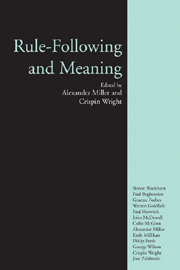Book contents
- Frontmatter
- Contents
- Acknowledgements
- The Contributors
- 1 Introduction
- 2 Skepticism and Semantic Knowledge
- 3 The Individual Strikes Back
- 4 Wittgenstein on Following a Rule
- 5 Wittgenstein, Kripke and Non-Reductionism about Meaning
- 6 Kripke on Wittgenstein on Rules
- 7 Critical Notice of Colin McGinn's Wittgenstein on Meaning
- 8 Meaning and Intention as Judgement Dependent
- 9 The Rule-Following Considerations
- 10 The Reality of Rule-Following
- 11 Truth Rules, Hoverflies, and the Kripke–Wittgenstein Paradox
- 12 Kripke on Wittgenstein on Normativity
- 13 Meaning, Use and Truth
- 14 Kripke's Normativity Argument
- Guide to Further Reading
- Index
10 - The Reality of Rule-Following
- Frontmatter
- Contents
- Acknowledgements
- The Contributors
- 1 Introduction
- 2 Skepticism and Semantic Knowledge
- 3 The Individual Strikes Back
- 4 Wittgenstein on Following a Rule
- 5 Wittgenstein, Kripke and Non-Reductionism about Meaning
- 6 Kripke on Wittgenstein on Rules
- 7 Critical Notice of Colin McGinn's Wittgenstein on Meaning
- 8 Meaning and Intention as Judgement Dependent
- 9 The Rule-Following Considerations
- 10 The Reality of Rule-Following
- 11 Truth Rules, Hoverflies, and the Kripke–Wittgenstein Paradox
- 12 Kripke on Wittgenstein on Normativity
- 13 Meaning, Use and Truth
- 14 Kripke's Normativity Argument
- Guide to Further Reading
- Index
Summary
Drawing on Wittgensteinian materials, Saul Kripke has raised a problem for anyone who thinks that we follow rules, say rules of meaning, in the ordinary sense of that phrase: the sense in which it suggests that rules are entities we can identify at a time and form the intention of trying to honour thereafter. He has presented a skeptical challenge to the idea of rule-following, elaborating – if not wholly endorsing – arguments which purport to show that the idea is rooted in illusion.
I believe that this challenge is of the greatest importance in the philosophy of mind, though many practitioners seem to think that they can ignore it. I argue that the challenge can be met and the reality of rule-following vindicated. But I show that, in order to meet it in this way, some quite dramatic shifts have to be made in the ways of conceiving mentality that have become standard among philosophers and psychologists.
The paper is in five parts. In the first I give a characterization of rules and rule-following, trying to show how central they are in our everyday thought about ourselves. In the second I present the skeptical challenge, drawing heavily on Kripke's work; I exercise some license here, since I do not aspire to be an exegete either of Kripke or of Wittgenstein. In the third section I offer my response to the challenge, outlining a non-skeptical conception of rules and rule-following.
- Type
- Chapter
- Information
- Rule-Following and Meaning , pp. 188 - 208Publisher: Acumen PublishingPrint publication year: 2002
- 1
- Cited by



